Hey y’all!
Hoping that everyone is enjoying the summer and my weekly nourishments for the mind.
In the words of the great DJ Khaled…Another one!
My daughter is going into her senior year of high school, which means senioritis, prom and the most important part- college applications and selection. As I’m getting ready to bite my acrylic nails down to the nub with the anxiety of handling this momentous year, I think back to almost four years ago when we went through the high school application process. Now for all y’all NYC parents, you know this process and waiting to find out where your child has been accepted are more stressful than waiting for the 2016 presidential election outcome and sometimes the results are just as devastating.
When my daughter applied to high school, we lived in District 10 in the Bronx. For anyone who knows the area, some of our schools include DeWitt Clinton (my alma mater) and John F. Kennedy high school. Now don’t get it twisted, I rep the BX all day, but the schools…not so much. As a parent, I take into consideration, graduation rate, college acceptance rates and safety. So I applied to District 2 high schools only. District 2 is in Manhattan and starts around the Financial District up to and including the Upper East Side and up to about 59th Street on the West Side. These are where the majority of the “good schools” are and ultimately she ended up in a District 2 school where she and I are both happy.
But it ain’t all peaches and cream. Let me explain but for that I need to go back in time to 1954.
Brown v. Board of Education
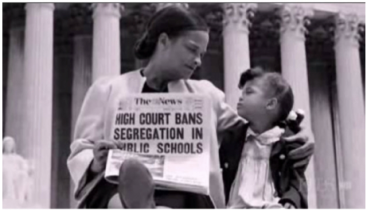
So for all y’all who passed U.S. History, you know about Brown v. Board of Education. It’s the landmark Supreme Court case in 1954 that desegregated public schools and overturned the 1896 case Plessy v. Ferguson that said “separate but equal”. Now Black kids could go to school with White kids and live in peace, harmony, equality, rainbows and puppies. Ever since 1954, we’ve been running around, patting ourselves on our progressive backs saying that this catapulted the Civil Rights Movement and showed that America was growing up.
I’m going to rate this decision out of a possible 5 “Girl bye’s” and give Brown v. Board a “4.”
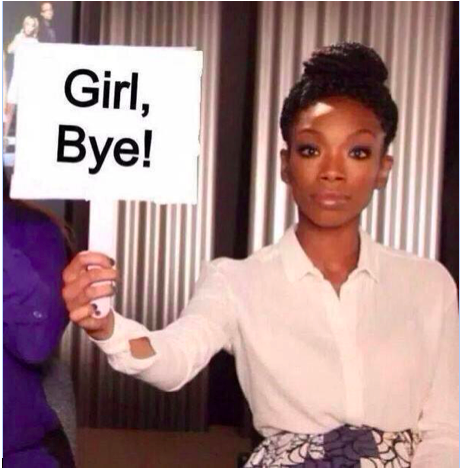
I know, I know. This is sacrilege. How dare I speak against progress for my folks? But I’m gonna argue that you only see it as progress if you hear only one side of the story, which is the dominant story, or the story you get when you have entered “The Wypipo Zone.”
Brown v. Board of Education Uncut
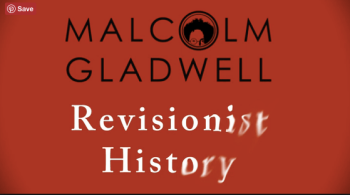 One of my favorite things to do, besides watching Love and Hip Hop, is listen to podcasts. Malcolm Gladwell’s Revisionist History is another jewel and if you don’t listen to any other episode, you have to listen to the one dated June 29th called “Miss Buchanan’s Period of Adjustment.” It goes deeper into the Brown v. Board case and all the things you don’t learn in your textbooks, classrooms and anything else White folks orchestrate. So here are all the reasons why I’m side-eyeing everything I’ve learned about this decision:
One of my favorite things to do, besides watching Love and Hip Hop, is listen to podcasts. Malcolm Gladwell’s Revisionist History is another jewel and if you don’t listen to any other episode, you have to listen to the one dated June 29th called “Miss Buchanan’s Period of Adjustment.” It goes deeper into the Brown v. Board case and all the things you don’t learn in your textbooks, classrooms and anything else White folks orchestrate. So here are all the reasons why I’m side-eyeing everything I’ve learned about this decision:
What was this case really about?
We have all been taught that Brown v. Board was about the fact that segregation created unequal conditions for Blacks. Black schools got poorer quality textbooks, teachers and facilities and as a result, students received a poorer education and this is not to say that this wasn’t true in some cases. But imagine the expression on my Black ass face when two of the plaintiffs, Darlene and Oliver Brown said that the real issue was simply that they wanted choice for their daughter, Linda. They actually praised the hell out of their Black schools and the academic and social/emotional competence of their children’s Black teachers, but the Black schools were sometimes farther away and they just didn’t want white folks telling them where they could and could not go to school.
I’m like, wait a, wait a, wait a minute, one got damn minute.
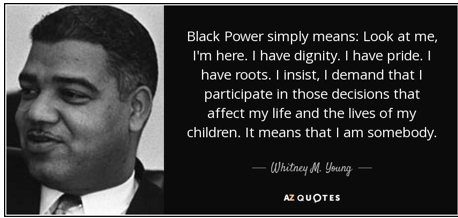
So black schools were dope, Black parents just wanted some control, some POWER. As a result, White folks were like “Oh hell to the nah”. That is not the narrative we’re going to the courts with. We can all imagine what the headlines to this case would’ve been- something like, “Uppity Niggers Want Options- What’s America Coming To?” So in the name of progress, they decided they were going to stick to the old “something’s wrong with Black people“ story. This is where the doll test comes in and makes people feel bad for Black people and as a result, we got integration. Ok Brown v. Board. You just earned your first Girl Bye.
Who had to do the integrating?
Let me just say, crackers be crafty y’all and let me tell you why. We got integration but based on my new lens, Black people were the only ones who had to integrate. What I mean is, Black folks were taken out of their communities and forced to go to all White communities to receive a “better” education. This is when bussing became a thing. Why weren’t the White students bussed to Black communities? Why weren’t Black teachers teaching White students? There wasn’t a fair exchange and America reinforced white supremacy by showing us that we had to leave the hood to get ahead. This is how sneaky White supremacy is because that is a mindset that is ingrained in many Black folks to this day. With integration, came violence. Let’s not forget the Little Rock Nine, who needed the National Guard to ensure that they would not be harmed when entering Central High School in Little Rock, Arkansas.
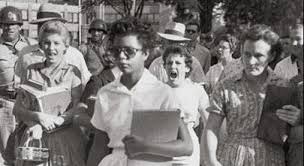
Their bodies and lives were on the line while White people’s pride and ignorance were at risk. I don’t recall any wypipo fearing for their lives as they walked through an angry mob of Black folks to get to school. You can look for that picture. Don’t worry. I’ll wait… Congratulations Brown v. Board. You earned another Girl Bye and advance to level 3.
Where did all those dope Black schools go?
Where do you think they went? They got rid of them. The thinking was, if y’all need integration then you don’t need all Black schools and if you don’t need all Black schools, guess what else you don’t need? Those Black ass teachers. They were gone with the wind and I don’t mean fabulous. Not only were Black kids being experimented on by seeing how well they could endure in mostly all white spaces but when they came back to their communities, they were met with their former teachers standing on the unemployment line. They also lost the cultural connection with their teachers. It means a lot to see someone that looks like you, who’s teaching you and holding you to a high standard. Black students lost that and to be honest, we’ve never gotten it back. Have you seen the percentage of White teachers in education versus Black ones? I rest my case. Girl bye granted.
How does this relate to me, personally?
As I stated earlier, the high school process is stressful. While I feel empowered to “choose” the high school my child can attend (I use quotation marks because while you can list 13 schools on your application, an algorithm ultimately matches your child to a school,) I also knew that my choices were still limited because I subscribed to the idea that in order for my daughter to be successful, she couldn’t go to a school in her own hood. It bothers me because all schools should be high quality schools but unfortunately that’s not the case. To the second point I made, our kids typically have to travel to the “good schools.” I feel like my daughter has already studied abroad considering the hour commute she takes one way each day. Lastly, while she goes to a school that has predominantly Black and Brown students, the staff, with the exception of the administration, is predominantly White. I am beyond satisfied with the academic part of her education but as she and I discuss college, she is strongly considering going to an HBCU (Historically Black College and University) because there is something missing from her educational experience and that is cultural connection.
Because 63 years later, we are still out here in these streets complaining about the same issues, I’m going to give my final girl bye to this court decision.
OK Educators
- What have you been teaching students about this groundbreaking case and its “real” impact on Black people and people of color?
- This episode of Revisionist History is the perfect counter-argument to the benefits of Brown v. Board. I could’ve sworn there was something about counterclaim in the Common Core Learning Standards. I’m just sayin’…you’re welcome.
- Have we really discussed the ways segregation is still alive and well in neighborhoods and especially in the NYC public school system? So
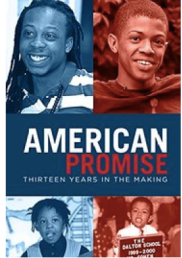 really, how far have we come?
really, how far have we come? - What are students’ perceptions of the education that they receive and what kind of education do they think they would receive in a predominately White school versus a predominately Black school? There’s a documentary called American Promise that shows two Black boys who go to a prestigious NYC private school and how that affects them. This could be another teaching tool. Check that out.
- Don’t just show the other side of the story in THIS case but the other side of Reconstruction, emancipation and all of the things that were supposed to be huge leaps for Black folks. Laws have never protected us because honestly. I believe when laws are written for Black folks, they’re written on wet napkins so I have little faith in them anyway.
Keep educating, keep being culturally responsive and keep side-eyeing all of the things that work against Blackness.
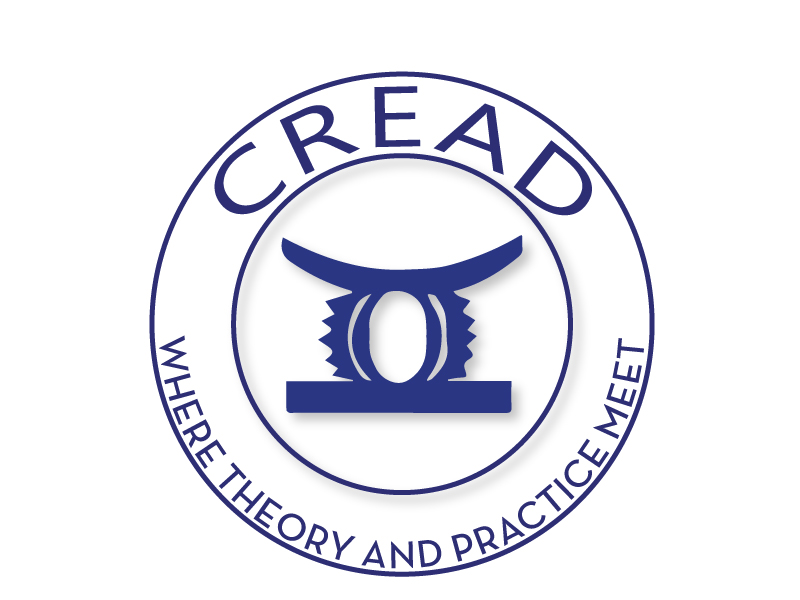

Wow, my mind is kind of blown. Brown v. Board of Education was one of those landmark “hero” cases in my mind. I should have realized all heros have flaws–but I feel kind of dumb for never thinking of the repercussions and the full impact the case had on Black communities. It’s amazing that the implications are still so far-reaching, that we still have a dire need for teachers of color to represent for the diverse students of NYC–especially in higher performing schools.
LikeLike
It was a hero case for me as well but two things kept bothering me, especially as of late. One, the story of Brown didn’t change from the first time it was introduced to me in middle school all the way to college. Mind you, I minored in Africana Studies and took courses at every level surrounding this issue. The other thing is, I grew up segregated so how can you say we’re integrated and I ain’t never seen a white person at the grocery store? I knew there had to be more and I’m glad that I came across this info and was able to share.
LikeLike
Thank you for bringing this to light. A lot of the decisions and laws passed or being passed is a one step forward, but with a condition or consequence for the black community. One thing we can do as parents is to allow our children to understand the difference between being “educated” and receiving institutional knowledge. Folks just need to continue to draw back the curtain of America that many of us have been living behind for so long and have a long look at what is actually occurring. Have a listen to Dr. Umar Johnson, some of his views may make you a little uncomfortable, if that is the space you are in, but he definitely has a pulse on next steps for the African American community. Keep us woke Khalya!
LikeLike
ANN, that educated v. Institutional knowledge is crucial. We already know these institutions don’t work in our favor so why accept the information they give to us? Students of color need to be critical in a very different way. Thanks for saying that.
LikeLike
This is your best piece yet. Your editorial style is developing with a mixture of fact and colloquialism that makes reading tour work more relatable and relevant. Your perspective on the historical shift and mindset of America post Brown v B highlights the tension that exists within the psyche of many non caucaison people seeking to emveyyer themselves. Thank you for your insight and for your voice.
LikeLike
Damn auto correct. * Embetter l, not emveyyer-
#covfefe
LikeLike
Thanks Chris. I feel the same way. It made me question a lot of the other things that I saw as progress for us and a lot of the information I’ve been given in my schooling. Listening to that podcast, I was like Damn Gina! What other information aren’t we getting and where they hiding it? Glad you got something out of it.
LikeLike
Getting my into Pre K was very stressful. We found a school that’s 15 minutes away driving on a good day with no traffic. The black teacher told me she will only take him if there is a good amount of black children because she does not want him to lose his culture. In a week she called back and he was in school. One day I picked my son up and his teacher is crying. She said your son did the most amazing thing today. She said she asked all the children what they love about themselves. Some said their hair their eyes etc my son said he’s black. All I did was smile.
LikeLike
Thanks Chris. I feel the same way. It made me question a lot of the other things that I saw as progress for us and a lot of the information I’ve been given in my schooling. Listening to that podcast, I was like Damn Gina! What other information aren’t we getting and where they hiding it? Glad you got something out of it.
LikeLike
* son .forgot a word in the first sentence.
LikeLike
That’s dope that your son has that self love. We need our black kids to feel like that from the womb. White parents also don’t have the added anxiety that black parents have. We worry about academics and culture when choosing schools for our children. Thanks so much for sharing.
LikeLike
Growing up in Texas, a black person’s level of success was defined by 1.)acquiring a good paying full time job with benefits, 2.) establishing a family and 3.) owning a house with a “white” picket fence in a “white” neighborhood. One could own a house, but such would not have been acknowledged as an accomplishment given the location. Black working and middle class aspired to get out of the ghetto, otherwise black neighborhoods with brick homes (not projects) to be in better neighborhoods, white communities. I recall my mother doing just that. Moving from the ghetto to the suburbs. Choosing to live in the worst part of the white suburbs, instead of the best part the black “ghetto”. Wasting money on an expensive apartment in the white neighborhood instead of purchasing a home in the black neighborhood. All for the sake of getting away from her own people.
While living in the “ghetto” my mother elected to have my sister and I attend private school. She worked 3 jobs to afford the tuition. We had a bad experience with a black teacher at the private school, as a result my mother labeled all black teachers as uneducated and mediocre. We eventually moved to the white suburbs, where I attended a public school. On the first day of the suburban school, I was greeted by a black principal and a black English teacher. My mother was furious, she moved us away from the “ghetto ” to get away from “ghetto” people, but was zoned in a white suburb school with black educators. She went through hell and hot water to get me out of the teacher’s class, her reason? Black teachers were unfit to teach children. The following year she enrolled me into a different school. It would be another 4 years before I would ever encounter another black teacher, and another 4 years after that, since the 5th grade.
I can’t help but to acknowledge the amount of damage inflicted on myself and siblings, because of my mother buying into this idea of white being right. She failed to realize that even with the move she made into the suburbs her children were still deprived of a rich educational experience. The gag is
…Black teachers and principals were strategically placed in the elementary school I attended, because the residential area for that particular zoned school was predominantly made up of blacks (the poorer area of the neighborhood). I was taken out of that school and placed into an unfamiliar setting with white people (The private school I previously attended was at least made up of blacks and latinos.) I was forced to reject my blackness to fit in, but more so to not become a target. I’m not sure if she’s even aware of the implications of her actions. I instantly became an outcast amongst the black community in my school setting. My black wasn’t black enough, and white folks despised me because I hadn’t quite reached the white mark.
I began rejecting my mother’s ideology upon entering high school, as I grew tired of being one of the only blacks in honor classes, one of the only blacks on the cheerleading team, and not having authentic black friends. I despised the idea that I was better than the other blacks because I was in honors classes. I certainly did not feel better.
Such experiences were major attributing factors to me being adament about attending a HBCU, Spelman. I wanted to be in school that uplifted and empowered and embraced blackness. I wanted the blackness that I shredded in middle school to regenerate. I wanted black friends. I wanted to live, learn, and absorb every bit of blackness, Spelman could possibly offer, knowing that the experience would be short lived.
LikeLike
Amber,
That’s not new. At one point during my daughter’s elementary school years, I thought she’d get a better education with white teachers. I didn’t fight to get her into a classroom with a white teacher but there was a certain amount of relief when I saw one. That’s ingrained in us unfortunately. I even wondered how parents would perceive me as a black teacher in front of their kids. We have to explicitly teach our kids to value blackness inside and outside the classroom.
LikeLike
I’m 42, and I can remember my mom and older family and friends always saying integration was one of the worst things to happen to the Black community. They discussed the loss of teachers/administrators, as well as the loss of community. Teachers knew their students’ families. They went to church together. Mourned and celebrated life together. They actually believed they were better off academically because they had support of their whole person. It wasn’t just about getting a grade, but emotional and psychological health.
LikeLike
Thanks so much for sharing. I believe integration damaged our mental health and historical perspective. Another example of divide and conquer. White people split us up and fed us the education that left us nutritionally starved. This needs to be discussed openly and all about discussion that leads to action.
LikeLike